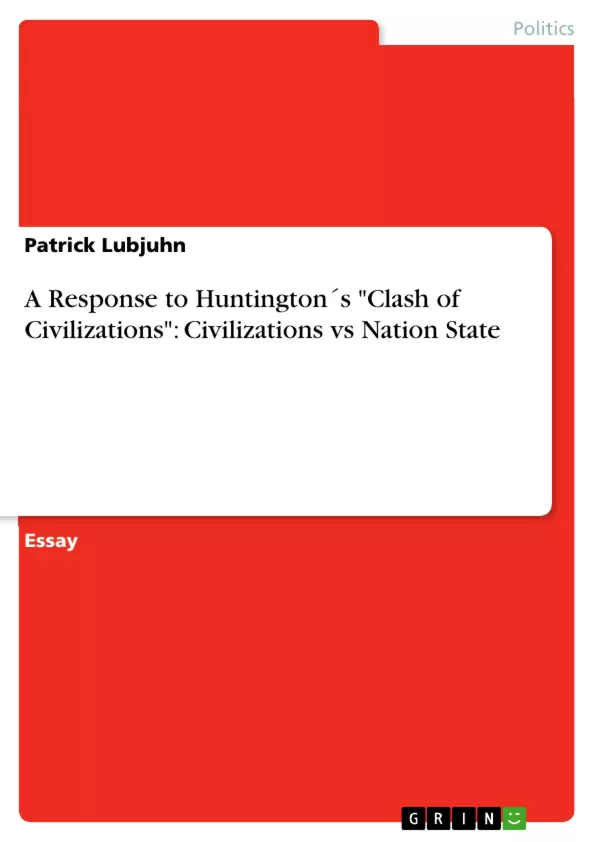Samuel P. Huntington was born in 1927 and is at the moment director of the John- Olin Institute for strategic studies at the University of Harvard. He was the author of an article, first published in the Foreign Affairs magazine, which has, according to Russel, Oneal and Cox ( 2000, p.584) “turned into one of the most influential recent books on international relations”. This article was called “the Clash of Civilizations?” and afterwards was extended (in 1996) to his book, called “The Clash of Civilizations and the Remaking of the World Order”. This book was meant to be seen as a response to his highly polarising and provocative article mentioned above. In it, he tries to give answers to the questions which arose from his article and tries to clarify his standpoints and claims to underpin his thesis. Samuel P. Huntington has given new currency to the notion of a clash of civilizations. His 1993 article on the topic in Foreign Affairs and his book following this article has gained a global audience.
Huntington argues that the bipolar division of the world based on ideology is no longer relevant. The world was entering a new period of intense conflict among civilizations. He states: “It is my hypothesis that the fundamental source of conflict in this new world will not be primarily ideological or primarily economic. The great divisions among humankind and the dominating source of conflict will be cultural. Nation states will remain them most powerful actors in world affairs, but the principal conflicts of global politics will occur between nations and groups of different civilizations. The clash of civilizations will dominate global politics. The fault lines between civilizations will be the battle lines of the future.” (Huntington, 1993, p.22) In trying to understand the causes of actual events like the 9/11 terror attacks on the United States of America many authors have turned to Samuel P. Huntington’s provocative and controversial thesis of a ‘clash of civilizations’. In the following part of my essay I am going to comment on his main issues, presenting the main thesis and his general claims of his book and article, dealing with a possible “clash of civilizations”.
Table of Contents
- Introduction: Huntington's Clash of Civilizations
- The Thesis of a “Clash of Civilizations”
- Huntington's “Civilizations” and the Reason for a Clash
- Civilizations and Conflict
- Conclusion
- Introduction: Samuel P. Huntington's Clash of Civilizations
Objectives and Key Themes
This book review aims to analyze Samuel P. Huntington's controversial thesis of a "Clash of Civilizations." It examines the core arguments presented in his book and article, discussing the potential for conflict between different civilizations and the implications for global politics. The review also critically evaluates Huntington's claims and presents alternative perspectives.
- The emergence of a "new world" after the Cold War
- The shift from ideological and economic conflicts to cultural clashes
- The role of civilizations in shaping international relations
- The potential for conflict between the West and Islamic civilizations
- The impact of cultural differences on democratic values and societal norms
Chapter Summaries
- Introduction: Huntington's Clash of Civilizations: This chapter introduces Samuel P. Huntington's thesis of a "Clash of Civilizations" and outlines the main arguments presented in his book and article. It highlights the shift from ideological and economic conflicts to cultural clashes as the driving force behind global politics in the post-Cold War era.
- Introduction: Samuel P. Huntington's Clash of Civilizations: This chapter provides background information on Samuel P. Huntington and the origins of his "Clash of Civilizations" thesis. It discusses the significance of Huntington's work in shaping contemporary international relations theory.
- The Thesis of a “Clash of Civilizations”: This chapter delves into Huntington's core argument that cultural differences are the primary source of conflict in the post-Cold War world. It examines his claims about the rising importance of civilizations in shaping international relations and the potential for clashes between different cultural entities.
- Huntington's “Civilizations” and the Reason for a Clash: This chapter explores Huntington's definition of "civilizations" and analyzes the reasons he believes these civilizations are prone to conflict. It examines his arguments about cultural differences, religious values, and historical grievances.
Keywords
The key concepts and terms explored in this book review include: clash of civilizations, cultural differences, international relations, civilizations, West, Islam, democracy, post-Cold War era, global politics, cultural conflicts, Huntington's thesis, and civilization.
Frequently Asked Questions
What is Samuel P. Huntington's "Clash of Civilizations" thesis?
Huntington argues that in the post-Cold War world, the primary source of conflict will be cultural rather than ideological or economic, occurring between nations and groups of different civilizations.
What does Huntington mean by "fault lines between civilizations"?
He suggests that the boundaries where different cultural entities meet will become the battle lines of the future, replacing the political borders of the Cold War era.
Why did cultural differences become more important after the Cold War?
According to Huntington, the bipolar division of the world based on ideology is no longer relevant, making cultural identity the dominant force in global politics.
Does Huntington believe nation-states are still powerful?
Yes, he states that nation-states remain the most powerful actors, but their interactions and conflicts are increasingly shaped by their membership in broader civilizations.
Which civilizations are central to Huntington's conflict analysis?
The review highlights the potential for conflict between the West and Islamic civilizations, as well as the impact of cultural differences on democratic values.
- Quote paper
- Patrick Lubjuhn (Author), 2005, A Response to Huntington´s "Clash of Civilizations": Civilizations vs Nation State, Munich, GRIN Verlag, https://www.grin.com/document/56913



